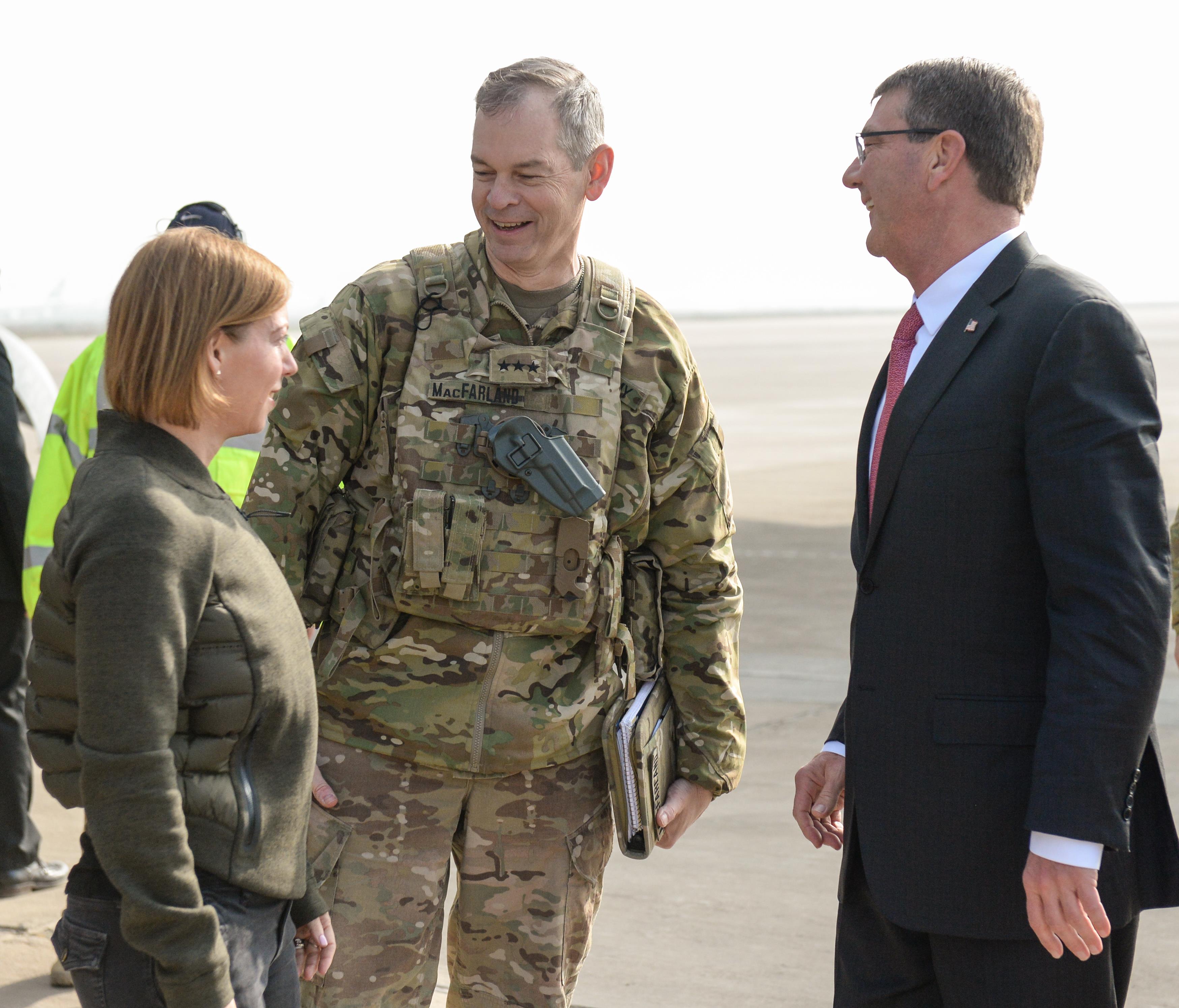By Cheryl Pellerin DoD News, Defense Media Activity
WASHINGTON, December 17, 2015 — Coalition and Iraqi forces
are making important progress against the Islamic State in Iraq and the Levant
in Iraq and in Syria, the commander of Combined Joint Task Force Operation
Inherent Resolve said yesterday in Baghdad.
Army Lt. Gen. Sean MacFarland, speaking to reporters who are
traveling in the Middle East with Defense Secretary Ash Carter, said progress
is incremental but significant.
“More recently we've begun to really make some progress with
our Iraqi security force partners in and around Ramadi,” MacFarland said,
adding that this validates the strategy of training and equipping, advising and
assisting the coalition’s ISF partners.
The enemy around Ramadi “has been attrited very
significantly and we're optimistic,” the general said.
Pushing the Enemy
MacFarland added, “Although they have their own ways of
doing things and it may not always be our way, it is … becoming increasingly
effective as they push the enemy out of that very important city of Ramadi and
begin to set the conditions to go back and take Mosul from the enemy as well.”
The coalition also is making progress in Syria with its
partners in the north and through the air campaign, he said.
“We're putting pressure on the enemy throughout the breadth
and depth of the battlespace,” MacFarland said, “and it's beginning to take its
toll.”
The general described the two countries as a complex
operational environment in which coalition partners must attend every day to
political realities.
Sorting Issues
In response to a question about Iraq’s demand that Turkey
remove troops and tanks that it sent two weeks ago into the Bashika military
camp near Mosul, MacFarland said the coalition is in full support of Iraqi
territorial sovereignty and the Turks are partners with the coalition in the
fight against ISIL.
“We’re doing our best to get this issue sorted out,” he
added, “but the overarching principle for us [is that] Iraq is a sovereign
country, and forces should only be here if requested by the government of
Iraq.”
Another question, he said, involved the U.S. offer of attack
helicopters and advisors to Iraq, which according to news reports the
government has declined.
In Dec. 9 testimony before the Senate Armed Services
Committee about the fight against ISIL, Carter said the United States is
"prepared to assist the Iraqi army with additional unique capabilities to
help them finish the job [of recapturing Ramadi], including attack helicopters and
accompanying advisers if circumstances dictate and if requested by Prime
Minister [Haider] Abadi."
MacFarland said yesterday in Baghdad, “Right now things are
going pretty well in Ramadi so the Iraqi security forces haven't asked us to
provide Apache [attack helicopter] support to them. If they were to ask, we
could do that, and we're prepared to do that.”
Strategic Conversations
On the process of working with the Iraqi government on the
fight against ISIL, the general characterized it as a conversation.
MacFarland described coalition members as disciples of 19th
century Prussian general and military strategist Carl von Clausewitz, and the
Iraqis as more like disciples of ancient Chinese general and strategist Sun
Tzu.
“If anybody knows
their military theories, you recognize that those two ways of war don't always
align perfectly,” he added. “But we're partners so we talk it out and they
adjust toward us sometimes and we adjust toward them.”
On the process of offering help to the Iraqi government, the
general said coalition members closely watch how the Iraqis are doing and
whether they need more enablers.
“If those enablers are required or appear to be required,”
he said, “that's a conversation I have with the prime minister or the minister
of defense, and then I message that back to my superiors in the United States.”
MacFarland added, “It's kind of hard to inflict support on
somebody, so we try to provide support, and … the kind of support we provide
has to be consistent with the way Iraqi security forces fight.”
The general gave an example involving military sustainment.
“As the Iraqis move themselves farther and farther up the
Tigris and Euphrates river valleys, pushing the enemy out of Iraq, sustainment
becomes more of a challenge. I mean, your lines of communication are getting
longer,” he explained. “Nobody does sustainment, nobody does expeditionary
operations better than the United States of America, so there are ways that we
can help them with that, and we're actively looking at that.”








No comments:
Post a Comment